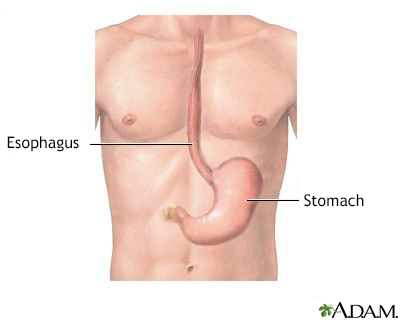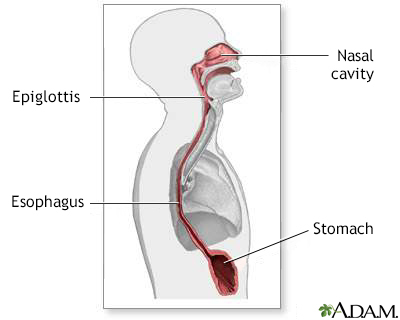Acid Reflux Ties to Esophageal Cancer
Gastroesophageal reflux disease, or GERD, may have links to esophageal cancer. GERD is a condition in which stomach acid leaks into your esophagus, or food…

Update your location to show providers, locations, and services closest to you.
Esophagitis is a condition in which the lining of the esophagus becomes swollen, inflamed, or irritated. The esophagus is the tube that leads from your mouth to the stomach. It is also called the food pipe.
Inflammation - esophagus; Erosive esophagitis; Ulcerative esophagitis; Eosinophilic esophagitis
Esophagitis is often caused by stomach fluid that flows back into the food pipe. The fluid contains acid, which irritates the esophageal lining. This problem is called gastroesophageal reflux (GERD). An autoimmune disorder called eosinophilic esophagitis also causes this condition.
The following increase your risk for this condition:
People who have a weakened immune system may develop infections. Infections may lead to swelling of the food pipe. Infection may be due to:
The infection or irritation may cause the food pipe to become inflamed. Sores called ulcers may form.
Symptoms may include:
The doctor may perform the following tests:
Treatment depends on the cause. Common treatment options are:
You should stop taking medicines that damage the lining of the esophagus. Take your pills with plenty of water. Avoid lying down immediately after taking the pill.
Most of the time, the disorders that cause swelling and inflammation of the food pipe, respond to treatment.
If not treated, this condition may cause severe discomfort. Scarring (stricture) of the food pipe may develop. This can cause swallowing problems.
A condition called Barrett esophagus (BE) can develop after years of GERD. Rarely, BE may lead to cancer of the food pipe.
Contact your health care provider if you have:


Falk GW, Katzka DA. Diseases of the esophagus. In: Goldman L, Schafer AI, eds. Goldman-Cecil Medicine. 26th ed. Philadelphia, PA: Elsevier; 2020:chap 129.
Graman PS. Esophagitis. In: Bennett JE, Dolin R, Blaser MJ, eds. Mandell, Douglas, and Bennett's Principles and Practice of Infectious Diseases. 9th ed. Philadelphia, PA: Elsevier; 2020:chap 97.
Richter JE, Vaezi MF. Gastroesophageal reflux disease. In: Feldman M, Friedman LS, Brandt LJ, eds. Sleisenger and Fordtran's Gastrointestinal and Liver Disease. 11th ed. Philadelphia, PA: Elsevier; 2021:chap 46.
Gastroesophageal reflux disease, or GERD, may have links to esophageal cancer. GERD is a condition in which stomach acid leaks into your esophagus, or food…
